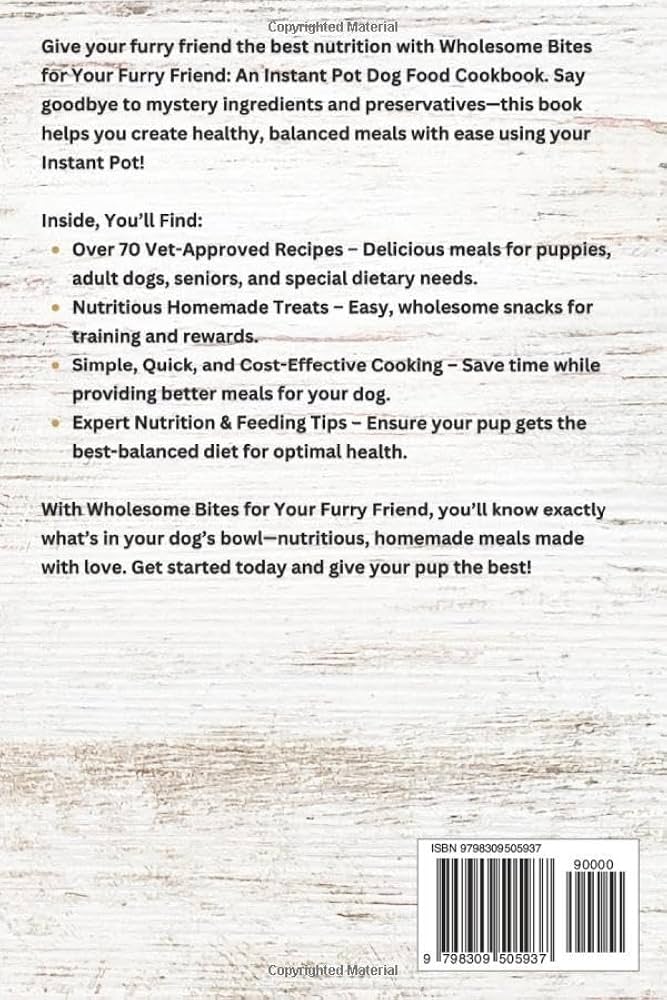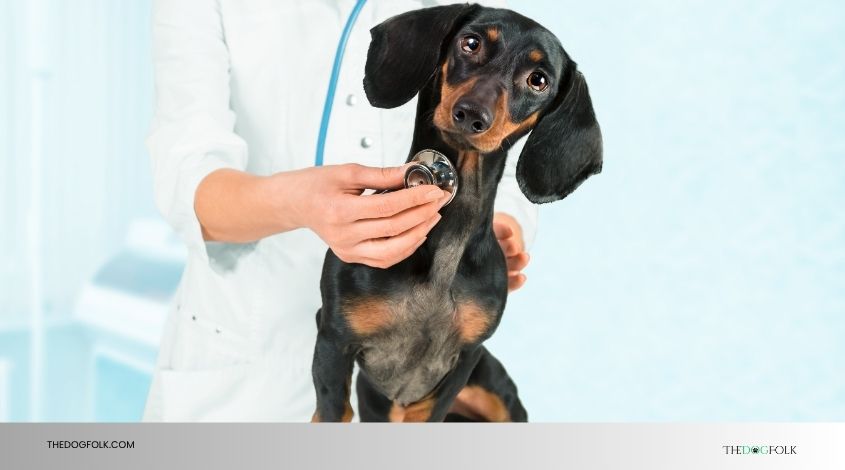Last Updated on September 24, 2025 by Emily Hartman
Are you wondering what to feed your beloved canine companion to ensure they’re getting the best nutrition possible? You’re not alone.
Many dog owners struggle with this very question. Feeding your dog isn’t just about filling their bowl; it’s about providing them with the nutrients they need to thrive and live a long, healthy life. Imagine knowing exactly what your furry friend needs to stay energetic, maintain a shiny coat, and keep those tails wagging.
You’ll discover vet-recommended nutrition tips that will help you make informed choices about your dog’s diet. Get ready to unlock the secrets to a healthier, happier pet, and give your dog the love they deserve through proper nutrition.
Contents
Balanced Diet Essentials
Understanding your dog’s nutritional needs is crucial for their health. A balanced diet supports growth, energy, and a strong immune system. It prevents health issues and promotes a longer life.
Veterinarians recommend a mix of proteins, carbohydrates, fats, vitamins, and minerals. Each component plays a vital role in your dog’s overall well-being.
Proteins: The Building Blocks
Proteins are essential for muscle development and repair. They provide energy and support vital functions. Include sources like chicken, beef, and fish in your dog’s diet.
Eggs are another excellent protein source. Ensure meats are cooked to kill harmful bacteria. Consult your vet for specific dietary advice based on breed and size.
Carbohydrates: Energy Sources
Carbohydrates fuel your dog’s daily activities. They offer fiber which aids digestion. Good carb sources include rice, oats, and sweet potatoes.
Feed carbs in moderation to maintain a healthy weight. Too many can lead to obesity. Monitor your dog’s response to different carb types.
Fats: Healthy And Necessary
Fats are crucial for cell function and skin health. They enhance taste and absorption of fat-soluble vitamins. Omega-3 and omega-6 fatty acids are vital.
Include fish oil or flaxseed oil in small amounts. Balance is key. Too much fat can cause weight gain and health issues.
Vitamins And Minerals: Small But Mighty
Vitamins and minerals support immune function and bone health. They are found in fruits and vegetables. Leafy greens, carrots, and apples are beneficial.
Ensure your dog gets a variety of nutrients. Some dogs may need supplements. Always consult with your vet before adding supplements.
Water: The Most Essential Nutrient
Water is vital for every bodily function. It aids digestion, circulation, and temperature regulation. Always provide fresh and clean water.
Monitor your dog’s water intake, especially in hot weather. Dehydration can lead to serious health problems.

Credit: www.amazon.com
Age-specific Nutrition
Understanding your dog’s nutritional needs can be a challenge. Different life stages require specific dietary plans. Puppies, adults, and senior dogs have unique requirements. Providing age-appropriate nutrition ensures your dog thrives. It boosts their energy and supports their health.
Puppy Nutrition
Puppies are growing rapidly. They need more protein and calories. Their diet should support bone and muscle development. Choose foods designed for puppies. These contain higher levels of nutrients. Frequent feeding is important. Small meals throughout the day work best.
Adult Dog Nutrition
Adult dogs need balanced nutrition. Their diet should maintain their energy levels. It should also support a healthy weight. Protein remains important but needs are less than puppies. Include vegetables and grains for fiber. Monitor their weight regularly. Adjust their diet as needed.
Senior Dog Nutrition
Senior dogs have slower metabolisms. Their diets should be low in calories. They also need more fiber and fewer fats. Joint health becomes a focus. Foods with omega-3 fatty acids help. Antioxidants boost immune health. Regular vet visits ensure the diet remains suitable.
Dealing With Allergies
Discovering the right food for your dog can ease allergy symptoms. Vets suggest hypoallergenic diets to prevent reactions. Consult your vet for tailored nutrition advice.
Feeding your dog is a vital part of ensuring their health and happiness, but what happens when your furry friend has allergies? Navigating the world of canine allergies can be challenging. You want to provide the best nutrition without triggering uncomfortable reactions. Let’s explore some vet-recommended tips to help you manage your dog’s dietary needs, especially when allergies are in the mix.
Understanding Food Allergies In Dogs
Food allergies in dogs can be perplexing. They might show up as itchy skin, ear infections, or upset stomachs. Have you noticed these symptoms in your pet? Identifying the culprit is the first step. Common allergens include beef, chicken, and dairy products. Keep a lookout for persistent symptoms after meals.
Elimination Diets: A Path To Clarity
An elimination diet could be your solution. This process involves removing potential allergens from your dog’s diet. You gradually reintroduce foods to pinpoint the problem. Have you tried documenting your dog’s reactions? This method is time-consuming but highly effective. Many pet owners find clarity by keeping a food journal.
Choosing Hypoallergenic Foods
Hypoallergenic dog foods can be a game-changer. These foods contain novel proteins like duck or venison. Have you considered these alternative options? They minimize allergy risks and offer balanced nutrition. Brands often advertise these products specifically for sensitive dogs. Consult your vet to ensure the choice fits your pet’s needs.
Homemade Meals: Tailored Nutrition
Crafting meals at home gives you control over ingredients. Would you like to try cooking for your dog? Homemade meals can exclude allergens and ensure nutrient-rich diets. You’ll need to balance proteins, carbs, and fats appropriately. Veterinarians often recommend this approach for dogs with severe allergies.
Regular Vet Check-ups
Regular vet visits are crucial for managing allergies. Has your dog had a recent check-up? These visits help track allergy progress and adjust diets accordingly. They also provide insights into new research and treatment options. Make these appointments a priority for your dog’s well-being. Caring for a dog with allergies requires patience and diligence. What steps will you take to ensure your dog’s nutrition is safe and effective? By tailoring their diet and monitoring reactions, you can significantly enhance their quality of life.

Credit: www.facebook.com
Choosing The Right Dog Food
Choosing the right dog food is crucial for your pet’s health. A balanced diet helps maintain energy and keeps your dog happy. With many options available, finding the best fit can be challenging. Understanding key factors ensures your dog receives the nutrition they need.
How To Read Dog Food Labels
Dog food labels provide essential information. Check for protein sources first. Ingredients listed first are most abundant. Look for real meat or fish. Avoid generic terms like “meat meal.” These may contain low-quality sources.
Notice the preservatives used. Natural preservatives like vitamin E are preferable. Artificial additives can harm your dog. Also, consider grain content. Some dogs have grain allergies. Opt for grain-free if your dog shows sensitivity.
Types Of Dog Food: Dry Vs. Wet
Dry food is convenient and helps clean teeth. It lasts longer and is often cheaper. Wet food has higher moisture content. This helps hydrate your dog. It is often more palatable and easier to digest.
Consider your dog’s preferences. Some dogs enjoy the crunchy texture of dry food. Others prefer the taste of wet food. Mixing both types can offer variety and balance.
Special Diets For Specific Needs
Some dogs have unique dietary needs. Senior dogs often require lower calorie diets. Puppies need more protein for growth. Active dogs benefit from energy-rich diets.
Consult your vet for special dietary advice. They can recommend food based on your dog’s health. Allergies, weight issues, and health conditions may require special diets. Tailor your dog’s diet for optimal well-being.
Importance Of Quality Ingredients
Quality ingredients impact your dog’s health. High-quality proteins support muscle development. Healthy fats provide energy and maintain skin health. Vitamins and minerals support immune function.
Choose dog foods with whole ingredients. Avoid fillers that offer little nutritional value. Quality ingredients ensure your dog thrives.
Credit: www.tiktok.com
Frequently Asked Questions
What Should I Avoid Feeding My Dog?
Certain foods are harmful. Chocolate, grapes, onions, and garlic can be toxic. Always check with your vet.
How Often Should I Feed My Dog?
Most dogs eat twice daily. Puppies and active dogs may need more frequent meals. Consult your vet for advice.
Are Homemade Dog Meals Healthy?
Homemade meals can be healthy. Ensure they are balanced with proteins, carbs, and fats. Vet guidance is recommended.
Is Dry Or Wet Food Better For Dogs?
Both have benefits. Dry food helps teeth; wet food provides moisture. Choose based on your dog’s needs.
Can Dogs Eat Human Food Safely?
Some human foods are safe. Cooked chicken, carrots, and rice are okay. Avoid foods with spices or additives.
Conclusion
Feeding your dog the right food keeps them healthy and happy. Follow vet recommendations for balanced meals. Choose high-quality proteins and fresh vegetables. Avoid foods with fillers and artificial ingredients. Understand your dog’s needs based on age, size, and activity level.
Hydration matters—always provide fresh water. Consider special diets for unique health concerns. Regularly consult your vet for personalized advice. Small changes can make a big difference. Your dog deserves the best nutrition for a long, active life. Prioritize their well-being with thoughtful food choices.
A healthy diet equals a joyful pet!

Emily Hartman is a lifelong dog lover, writer, and canine care enthusiast. With years of experience in pet parenting and a deep passion for helping others raise happy, healthy dogs, she shares practical tips, thoughtful advice, and product recommendations to make life better for pups and their people. When she’s not writing, you’ll find her hiking with her rescue lab, Milo, or exploring new dog-friendly spots around town.

